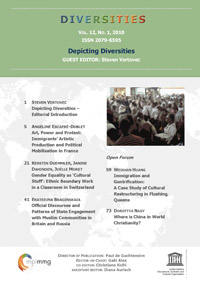Gender Equality as ‘Cultural Stuff’: Ethnic Boundary Work in a Classroom in Switzerland
by Kerstin Duemmler, Janine Dahinden, Joëlle Moret (Maison d’analyse des processus sociaux (MAPS), University of Neuchâtel)
To cite this article: Duemmler, K., Dahinden, J., & Moret, J. (2010). Gender Equality as ‘Cultural Stuff’: Ethnic Boundary Work in a Classroom in Switzerland. Diversities, 12(1), 21–39. https://doi.org/10.58002/vv19-mk79
The idea of boundary work has become a key concept in studies on ethnicity and provides new theoretical insights into the social organisation of cultural difference. People articulate ethnic boundaries in everyday interactions using conceptual distinctions to construct notions of ‘us’ and ‘them’. This study is based on an empirical case study (ethnographic fieldwork, interviews) with young people (16-21 years old) in a Swiss vocational school. The results emphasise that the moral imperative of gender equality is the most significant category used to create boundaries between Swiss and Albanian migrants. Our study considers boundary work as relational and thus examines the strategies of both the Swiss majority and the (male) Albanian minority. Results suggest that the boundary itself is seldom contested by either Swiss or Albanians, and we argue that the visibility of the boundary (‘brightness’) is closely linked to larger power relations in society between those groups.
|
